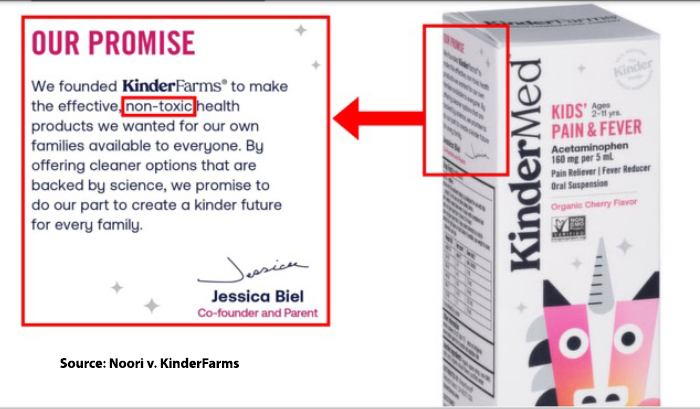“Just got the following email from KinderFarms, a "natural" kid's medicine company that objects to all the "unnatural" things found in children's OTC medications. Damn, they picked the wrong person to spam with this.”
- Dr. Josh Bloom, ACSH’s Director of Chemical and Pharmaceutical Sciences
As our Dr. Josh Bloom reports, KinderFarms Pain and Fever reliever contains the generic form of Tylenol, a well-known liver toxin in high doses. But it is the removal of the GMOs and other “inactive” ingredients that Biel claims makes her product warm, cozy, non-toxic, and “safe.” By eliminating the inactive ingredients found in conventional (and far cheaper) OTC products for kids – Biel is representing she’s providing a safe customer experience.
“KinderMed Kids’ Pain & Fever is made with the same effective, active ingredient (acetaminophen) as the leading brand but without the top 9 major food allergens, dyes, parabens, GMOs, high fructose corn syrup, artificial flavors or sweeteners. Doctor-formulated with only 5 ingredients, … KinderMed is Non-GMO Project Verified, vegan, gluten-free and kosher.”
– KinderMed Advertising
Plaintiff’s Attorneys Agree with Josh:
In March, a class action lawsuit was filed against KinderFarms, and, taking a line from Josh’s reporting, alleges they peddled misleading information. While no one was injured from ingesting the product, their pocketbooks might have been burned. The action seeks both compensatory and punitive damages:
“To capitalize on consumer demand for “non-toxic” medications, Defendant makes false and misleading “non-toxic” claims about its KinderMed (pronounced “kind-er-med”) children’s medicine product line to sell KinderFarms products at a premium price. Even though Defendant knows that the ingredients in KinderMed products are in fact toxic…”
Greenwashing
The plaintiffs claimed that KinderFarms “greenwashed” their products by deceptively and fraudulently labeling them to prey one fears associated with sugars and other “inactive” stuff in conventional medicines. These inactive components supposedly cause bloating and other gastrointestinal issues – from which Biel intends to protect her customers.
Greenwashing has several meanings. An ally of the plaintiffs’ bar, The National Resource Defense Council offers this:
“Greenwashing is the act of making false or misleading statements about the environmental benefits of a product or practice.”
Because of the confusion and dangers incident to the use of the term, the United States Federal Trade Commission (FTC) created the “Green Guides,” which specifically address using the term “non-toxic” in marketing:
“A non-toxic claim likely conveys that a product, package, or service is non-toxic both for humans and for the environment generally. Accordingly, [i]t is deceptive to misrepresent, directly or by implication, that a product, package, or service is non-toxic… “

According to the complaint, the presence of a known toxin, acetaminophen, the generic name for Tylenol, makes the KinderFarm claim misleading. But it may be the greenwashing i.e., the elimination of the inactive ingredients (the removal of which KinderFarm touts as a customer benefit), that makes the product defective. In fact, two weeks after filing, the plaintiff's lawyers voluntarily withdrew the suit – with prejudice, meaning they won’t be refiling.
We need to keep our eyes on this greenwashing – which may have resulted in a recent and far more significant consequence than leaving the “inactives” in the product.
On November 17, the FDA reported that KinderFarms voluntarily recalled the Pain and Fever formulation. Per the Hawaii Department of Health, the reason, product instability, was also disclosed on the company website.
“Acetaminophen is the active ingredient in many pain-relieving medicines. As a result of the potential health risk with acetaminophen being outside of specification, the product may cause acute adverse health effects….”
While we don’t know in what way the Kinderfarm product was “outside specifications” or “unstable” and whether the elimination of a crucial component, such as a preservative, was causal, the development warrants further investigation.
Drug Stability And Preservatives
Problems with acetaminophen stability are well known. [1] Drugs are supposed to be stable – meaning that they both retain their efficacy and don’t degrade into toxic byproducts. However, heat, humidity, and acids, imay cause the product to degrade over time. Hence, preservatives are added to keep the drug functional and as non-reactive as possible.
Preservatives are considered inactive ingredients – “any non-active ingredient in a medicine…. Some inactive ingredients are essential for a medicine to function as intended. For instance, an active ingredient that does not dissolve easily might use an inactive ingredient to help the body absorb it.”
Preservatives are used to prevent microbial growth and prevent product breakdown by oxidation. There are “natural” preservatives, like salt, honey, and certain fruits, although these primarily address microbial contamination and some are subject to breakdown themselves. Others, like Vitamin E and citric acid, address oxidation, but they vary in consistency and duration of effectiveness and are more challenging to regulate. Hence, chemical preservatives are added.
The usual shelf life for adult acetaminophen pills is four to five years; liquid Tylenol for children has a shorter life span, as represented on product labels bearing an expiration date of about a year and a half post-manufacture. The primary concern, however, is loss of potency, not toxic degradation or harm.
Given that KinderFarms first unveiled its products a year ago, one wonders how it could have gone bad- so fast? Could the inactive ingredients that KinderFarms removed explain their active problems with instability? Given the FDA’s use of the word “unstable” and the symptoms described, the company is more likely concerned with oxidation or breakdown, which might have been avoided had chemical anti-oxidants been added.
For now, three cheers for chemical preservatives.
[1] Stability [of Acetomenophen]: “Dry, pure paracetamol is stable to 45°C. Contamination with traces of para-aminophenol and humid conditions that cause hydrolysis to para-aminophenol result in further degradation and discoloration. Slightly light-sensitive in solution, and degradation is catalysed by acids or bases.”




